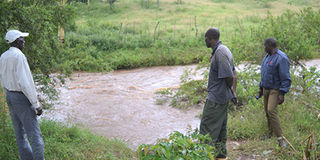Mystery of bodies retrieved from Nakuru’s Molo River

Baraka A community village elders at the banks of Molo River in Rongai, Nakuru County on December 2, 2019. The villagers says the river has turned to be a death trap as human bodies are often retrieved from it. PHOTO | SAMUEL BAYA | NATION MEDIA GROUP
What you need to know:
- There have also been cases of people dying in the river locally.
- The bodies get stuck in the bushy part of the river adjacent to the village.
- He added that many people in the village are jobless yet they could use the river for farming.
For residents of Baraka, a village in Rongai, Nakuru County, living in proximity to a river has become more of a curse than a blessing.
On a number of occasions, they have collected human bodies carried by Molo River from other regions to the area, thus making them afraid of using the water for domestic purposes.
There have also been cases of people dying in the river locally.
Mr Thomas Ledamaa, a Nyumba Kumi ambassador from the village, told the Nation that a university student died there six months ago.
DROWNING
“Although we have few cases of children drowning in this river, an incident happened six months ago when the child of one of our neighbours died after falling into the water. The young university student was taking a selfie near the river when he fell and drowned,” said Mr Ledamaa.
He added that there have been several cases where villagers have collected bodies carried by the waters.
The bodies get stuck in the bushy part of the river adjacent to the village.
“Often, we wake up in the morning only to find bodies floating in this river. Most of the time, we don’t know where they come from, but we believe they are people who die on the upper side of Molo River and are washed downstream to this village,” he said.
“I have lived here for the past 10 years and we were told by the government to only use the water from this river for home use and not for irrigation.
WATER EMBARGO
Mr Peter Gathugo, a village elder, said they have tried to get the government to allow them to use the water for irrigation to no avail.
“We have a population of about 300 households. The problem we have with this river is pollution, as some industries release their waste into this river. In the morning, the water has a strong stench which is unhealthy for us,” said Mr Gathugo.
He confirmed that the government only allowed them to use the river’s water to wash their clothes but not for any other use.
“Our only cry is for the government to give us the nod to pump this water into our farms instead of putting an embargo on the same,” he said.
Another elder, Mr Joseph Ochieng, said the community has been retrieving bodies from the river for a while now.
DISEASES
“Recently, a rotting body was found on the banks of this river, just next to the village. We are worried about the diseases we could contract if we use the water for domestic purposes. If we try to irrigate our vegetables, our pumps are confiscated," said Mr Ochieng.
He added that many people in the village are jobless yet they could use the river for farming.
“This river has turned to be a source of dead bodies. This is unfortunate,” he said.
Former Rongai parliamentary aspirant Kibet Komen said the government stopped the locals from using the river’s waters for irrigation because it serves many people, and if its waters are diverted to every village then that would affect its flow.
IRRIGATION
“That river supplies water from Molo down to Baringo. The government stopped locals along its banks from using its waters for irrigation, especially during the dry seasons.
‘‘But since it is now raining and the water levels have risen, then I think the locals can be allowed to use it in their farms,” he said in an interview.
Mr Stanley Kiptanui, a peace committee elder in the village, said when they were being relocated by the government, they were told not to irrigate their farms using water from the river.
“We were also stopped from farming near the river, and were also cautioned by the government that we should not plant trees that use a lot of water to grow. But because we want to develop this place, the government should allow us to use the river for irrigation so that our lives can change,” he said.





